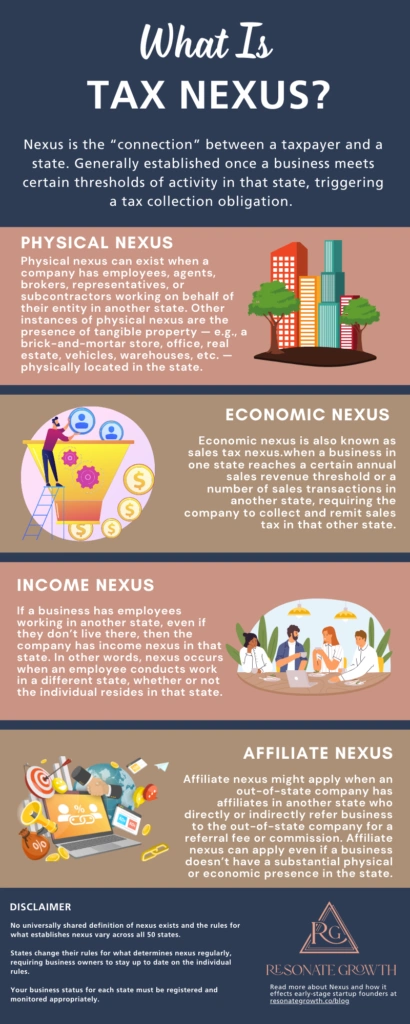Series: What Early Stage Founders Need to Know About Hiring
Table of Contents
- What the Nexus?
- Let’s use a typical Silicon Valley startup as an example.
- Is this something I can handle internally?
- Nexus Categories
- In Closing
You’re knee-deep in the thrilling chaos of creation, giddy over the ocean of remote talent you’ve reeled in. You’ve hooked an A player and are itching for them to fire up their laptop and start blazing trails. But hold on! Hiring remote or distributed team members from a state other than your headquartered location adds an extra kick to the mix. Taxes.
Unfortunately, it’s not as simple as plugging them into your payroll system and calling it a day. There’s a whole conga line of legal and compliance hoops to jump through before officially hiring someone from another state.
In the second installment of my series on early stage startup hiring, I will focus on one of the bigger hoops to jump through when building a distributed workforce: Nexus tax and what it means for hiring and payroll.

What the Nexus?
“Nexus” refers to the establishment of a “connection or link” with another state, beyond the state where your business is headquartered or domiciled. There are multiple ways to establish Nexus with other states, which are further divided into subcategories, adding layers of complexity.
For instance, hiring a remote employee, maintaining a warehouse, or selling your product or service in another state are just a few ways to establish such “connections”.

Let’s use a typical Silicon Valley startup as an example.
Your business may be incorporated in Delaware, but the actual headquarters (HQ) is domiciled in San Francisco, CA. Whether it’s a garage or a small office, whatever you defined as your company’s physical location when you formed the business, is your HQ.
But, when you hire a remote employee based in Austin, TX, you’ve established a Nexus or “connection to” Austin under the Physical and/or Income Nexus categories. As such you are required to register for tax collection or payment, or possibly both, in each state you do business in or have employees in.
The rules and regulations for this process vary from state to state; hence your business status for each state must be registered and monitored appropriately.
Is this something I can handle internally?
I wouldn’t recommend it.
In the past, I handled these processes internally, for several reasons:
- As Head of Ops for an early stage startup – I managed every department involved in the hiring process. Ensuring compliance in every state where we hired remote employees was part of that.
- As a seed-stage company in 2022, we noticed the beginning of some belt tightening in the VC world. So I opted to save the consultant fees and handle internally.
- Full transparency, I didn’t know what I was getting into. It’s not that it was hard, it’s just…the government…need I say more?
- I’m stubborn as hell, so once I committed to the process, there was no turning back. Delegation was never my strength.
While it might seem appealing to cut costs by managing tasks on your own or leveraging a friend, I would exercise caution here. It’s one thing to rely on your co-founder’s sister for bookkeeping, but it’s crucial not to cut corners with complex tax matters.
Bottom line, don’t be me. If you’re a founder or an early stage startup lacking operational staff, delegate.
Nexus Categories
Nexus encompasses a variety of categories, with a significant emphasis on sales and income tax. While it may be a bit mundane, obtaining a basic understanding of this concept is crucial when hiring and selling.
It’s worthwhile to note that each state has different thresholds for nexus and taxes, which can change rapidly. With the growth of online business, states are constantly introducing new laws to capture a portion of your revenue. As your business grows, it’s important to work with your accounting firm to navigate the complexities and ensure all your tax obligations are met.
In this post, I’ll focus primarily on physical nexus and its relation to payroll taxes. However, I will also briefly discuss economic and income nexus for informational purposes. This article goes into a bit more detail on additional nexus categories.
Alright, let’s get physical!
Physical Nexus
If your business has a tangible, 3D presence in another state – such as an office with staff or even a single remote employee residing there – it establishes a physical nexus. This scenario implies that your business has a remote office, even if it’s their home. Consequently, this necessitates payment of various employment and payroll taxes in that state. These are subject to change depending on the specific state’s regulations.
Two other examples of physical nexus that most states agree on are a storefront or a warehouse located in another state. With expansion, it will become important to be aware of other forms of nexus not mentioned in this post, as well as the qualifying criteria that vary by state.
You just hired a remote employee, thereby creating a physical nexus. Now what?
There are a number of hoops to jump through but I’ve listed a few highlights below.
- Register your business with the relevant state agencies such as the Comptroller and/or Secretary of State.
- Specific agencies vary depending on location
- Register your business with all the relevant local government agencies. E.g. City and County jurisdictions.
- Specific agencies vary depending on location
- Create accounts on all the state and local jurisdictional web portals, where applicable.
- Acquire all pertinent licenses, tax identification numbers, and account numbers associated with each state and local jurisdiction where the employee resides. This process will take several weeks.
- Once the above are obtained, they’ll need to be added to your company’s payroll system.
- Employ a registered agent to represent your business in that state.
- This box is easy to check as there are several online resources you can tap, including your accounting firm who likely offers this service.
When should this be done?
Ideally, you want to initiate this process as soon as both parties sign the employment offer. I also recommend informing your accountant about your hiring plans early on, especially if you intend to recruit remote employees from other states or countries.
This serves three purposes:
- Enable them to prepare accordingly
- Provide them with an opportunity to offer valuable advice or share crucial information before you begin the recruitment process.
- Allows them to set expectations concerning timelines and processes
They’ll likely advise you to reach out once you have a signed employment offer. But as you wouldn’t set a wedding date without an engagement first – don’t shell out money before the candidate commits.
Why can’t I do this later or during tax season?
This process can take weeks, depending on the efficiency of the state and local governments involved. Larger states are more automated but often have backlogs and challenges connecting with an actual human. On the other hand, smaller states are more manual in terms of paperwork but often have quicker turn times and a live person available should questions arise.
The key is to initiate the process as soon as the remote employee commits. Procrastinating could cause complications down the line. The last thing you want is for your tax accountant to find out you hired four remote/distributed FTEs last year and haven’t filed or withheld the proper taxes.
This oversight can lead to extra work, costs for cleaning up the situation, paying back taxes, and potential penalties for late payments.
In the gentlest way I can put it, save yourself the heartburn and nail it from the get-go.

When should I schedule my remote hire’s start date?
In my past positions, I typically set the remote employee’s start date at least two to three weeks post-offer date. This gave me enough time to wrestle with the paperwork monster and come out victorious. But I’am also a freak when it comes to organization; I need every box ticked before I can sleep at night.
You may not need to delay things that long, but I recommend reviewing it with your accountant first. They know your business details and are up to date with the latest tax laws. If you need someone to start before receiving your tax rates and account numbers, they will be able to help you navigate the process.

But my remote hire is starting next week. What should I do?
There’s no need to panic. Much of the necessary data is sourced from the employee’s W-4 and your payroll system can handle most calculations automatically. It may take a few payroll cycles before everything is aligned, as you’ll have to wait for your account numbers and tax rates to be issued and mailed (yes, mailed) to you by the state.
Since payroll deposits and reports are filed quarterly, you likely have some leeway, depending on where you are in the quarterly cycle. If you have discrepancies, you may have the option to file an amendment or make a late payment. However, this could result in some penalties depending on your specific tax circumstances.
It’s also important to note that estimating local government taxes can be more complex due to lack of uniform standards. For example, certain rates are higher in the first year before decreasing in subsequent years.
A proficient accounting firm should possess comprehensive knowledge of all the prevailing tax rates, and be able to guide you on the most appropriate way to navigate the situation. Just be aware going forward that failing to withhold and deposit taxes on time may result in significant penalties.
For more information on Payroll Tax obligations and filing timelines, see the Additional Resources section at the end of this post.
Income Nexus
Also known as income tax nexus. Once you have established physical nexus, you need to determine whether you also qualify for state income nexus. Most states collect income taxes but a handful do not, like Texas for example, so it’s important to verify.
Income nexus can be triggered by an employee simply conducting business activities in a state. Regardless of their residence or your lack of physical presence there. In today’s digital age, states are working hard to enact legislation allowing them to capture tax revenue wherever they can.
Given the complexity and various qualifying factors in each state, obtaining accurate information regarding your obligations can be daunting. It’s not the most efficient use of your time and energy to navigate this on your own. So, toss it over to your accountant and save yourself from a grueling match of mental Wimbledon!
For more detailed information, there are some legal benchmark cases regarding nexus worth reviewing at the end of this post.
Economic Nexus
Also known as sales tax nexus. This refers to a situation where a business has ties to a state, often through sales, without necessarily having a physical presence there. Similar to other types of nexus, sales tax rules differ from state to state. Each jurisdiction sets its own regulations, registration procedures, and tax rates for out-of-state retailers.
There are generally two ways to have an economic nexus via sales in a state:
- Total sales dollar amount
- By transaction (a specific number of sales).
Upon reaching the specified threshold in a particular state, you establish a nexus there and become obligated to collect and/or pay taxes. This can also impact various entities such as remote sellers, marketplace facilitators, and payment processing services, depending on the state.
Numerous online resources exist that allow you to examine the different thresholds between states, here is one example. Your accounting firm should also have this information readily available to monitor your status and address requirements.
In Closing
Well, if you’ve managed to resist the sweet call of a nap and stuck with me through this riveting saga of Nexus (cue dramatic music), I salute you!
With a bit of luck, you’ve absorbed enough knowledge to understand the circus act of building a remote or distributed workforce. And hopefully, you’ve learned that Nexus is like that weird cousin – interesting but best handled by someone else. In this case, your accountant who thrives on the nitty-gritty details.

Additional Resources
Two prominent cases regarding nexus weighed in on by the US Supreme Court
Read more from this series on What Early Stage Founders Need To Know About Hiring
- Series: What Early Stage Founders Need to Know About Hiring
- Part 1: Distributed Teams: 3 Things Startups Need To Know
- Part 3: Startup Hiring: The Importance Of A Good Onboarding Process
- Part 4: Startup Hiring: How To Build An Employee Onboarding Workflow + Free Download
- Part 5: Tutorial: New Hire Welcome Packet & Onboarding Workflow



